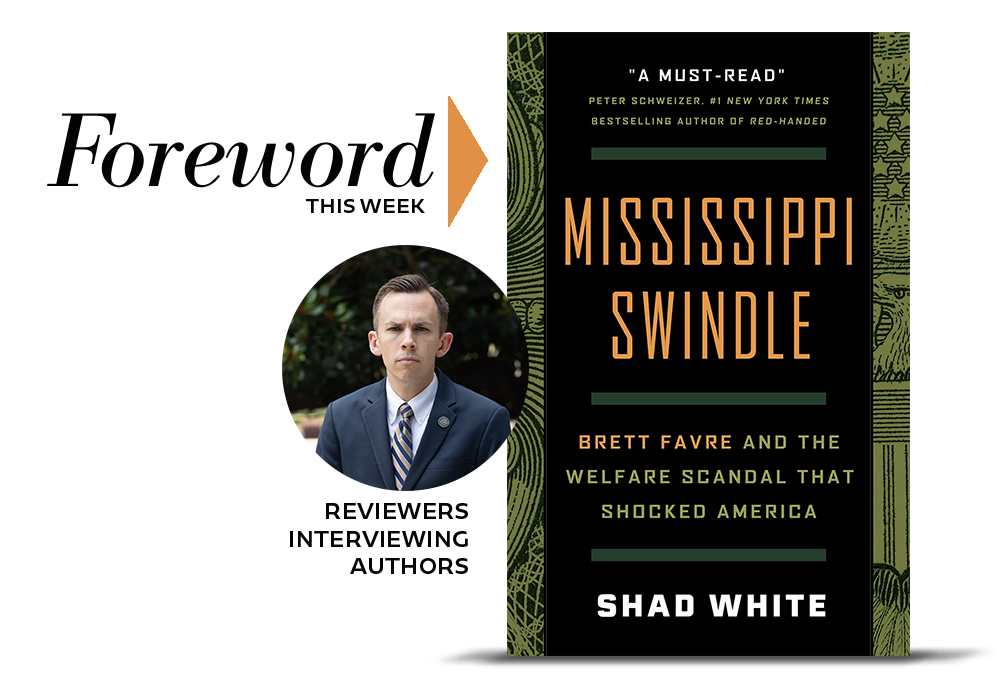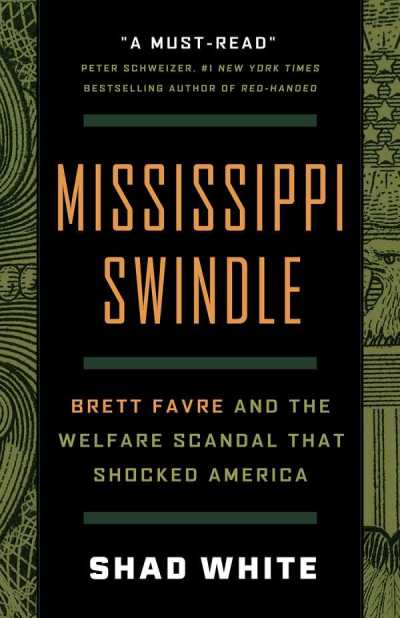An Interview with Shad White, Author of Mississippi Swindle: Brett Favre and the Welfare Scandal that Shocked America

“I worry that fraud involving programs intended to help the poor is happening around the country. Congress said as much last year when it asked the Government Accountability Office to investigate … They pointed out that there is a fear that what happened in Mississippi could be emblematic of a larger trend.’’ —Shad White
Today’s interview with Shad White tells the tale of a shameless scandal in Mississippi’s welfare program. Shocking stuff to be sure, but it also serves as a reminder that when fraud happens in government entitlement programs, most often the “cheaters” are executives and managers, not undeserving poor families gaming the system, according to the Association of Certified Fraud Examiners.

Statistics are hard to find, but if you’re looking for a real culprit in welfare waste, check out good ol’ bureaucratic incompetence. Audits and lots of inspector general reports by the Health and Human Services find “improper payment” levels from 20 to 40 percent in state welfare (TANF) programs. And while they specify that those improprieties mean “errors, abuse, and fraud,” a careful study of the reports reveals “eligibility, payment calculation, or documentation errors” not intentional fraud by beneficiaries.
So, all that scaremongering about “welfare queens” and the like is just that: racist and mean spirited.
Before you get to the interview, check out Kristen Rabe’s review of Shad’s Mississippi Swindle in Foreword’s July/August issue.
Your account begins with a call from Governor Phil Bryant regarding a suspected kickback scheme and ends with a sprawling indictment involving nearly $100 million in stolen welfare funds. The case received a lot of media attention. As a refresher, briefly describe the fraud your team found.
The whistleblower phone call that started this came in June 2019, and by the end of a seven-month investigation, we’d discovered the largest public fraud scheme in state history. My team uncovered that TANF funds—that is, Temporary Assistance for Needy Families, more commonly known as welfare—had been misspent over several years in Mississippi. Welfare dollars went to advertisements at college bowl games, beauty pageants, donations to local charities, experimental concussion treatment research, and lots of other things that were not TANF-eligible. Some of the money was taken by fraud, and at present, six individuals have pleaded guilty to state or federal charges for their role in that theft.
Your team identified several government officials, as well as sports figures and prominent socialites, who were involved in or complicit in these crimes. Who were the key figures involved in this fraud?
The people who have pleaded guilty are John Davis (the former director of the agency that controlled welfare funds), Nancy and Zach New (a mother-son duo who ran a non-profit that benefited from welfare dollars), Anne McGrew (the News’ accountant), Brett Dibiase (a former professional wrestler), and Christi Webb (another non-profit director). Others, including Hall of Fame quarterback Brett Favre, surfaced in our investigation but have not been charged.
The book offers a great behind-the-scenes look at the internal politics of pursuing a large investigation. How did your team enlist assistance of key state and federal agencies?
We always have to take our cases to a prosecutor, and that person decides if charges will be filed or not. If the person is indicted, we then arrest the individual. In this case, we did that, and we also took our findings to the FBI so they could fully investigate the case alongside us.
You affiliate with the Republican party, but you describe this as a truly bipartisan effort. Talk about the importance of—or perhaps, the challenges in—achieving cooperation across party lines.
There were really no challenges working across party lines. When I spoke with the district attorney (who is a Democrat) or the US attorney appointed by President Biden, politics never came up; and I believe politics played no role in how the case was handled. Everyone tried to do their job and follow the law.
Your account is gripping and deeply engaging. What inspired or influenced your approach to writing this book?
I wanted to tell the story—which is complex—in a way that a normal taxpayer would understand. To do that, I felt I had to be vivid in my descriptions of the characters and scenes involved, to the extent I could. Other true crime books like Bad Blood or Black Edge were inspirations, along with books on complex financial machinations like The Big Short and Conspiracy of Fools.
In June, the Minnesota attorney general charged five people for defrauding the state’s Medicaid program of nearly $10 million. The details sounded strikingly familiar. How common are these crimes? What can or should be done to prevent them?
I worry that fraud involving programs intended to help the poor is happening around the country. Congress said as much last year when it asked the Government Accountability Office to investigate whether there is TANF fraud around the country. They pointed out that there is a fear that what happened in Mississippi could be emblematic of a larger trend. When I testified before Congress, I suggested they improve oversight of these funds, closely monitor non-profits who are supposed to disperse the funds, and force state agency heads who are spending welfare funds to sign under penalty of perjury a statement about how many people they served, among other things.
Telling this story took courage. Why were you determined to write this book?
I thought taxpayers and Mississippians deserved to have the full story told all in one place—and ideally in a compelling way. I was also emboldened by my time serving in the military. I’ve worked with men and women who have deployed into combat, and I thought, “If those folks are willing to risk their lives to do their jobs well, what am I willing to risk today to do my civilian job well?” To honor the work of the men and women in the auditor’s office, their story needed to be told.
Kristen Rabe
